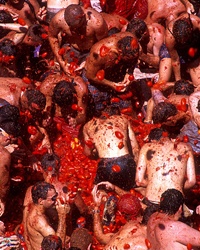 David Wootton / Alamy World’;s Strangest Festivals
Want to understand a culture better?Just attend one of its celebrations.
David Wootton / Alamy World’;s Strangest Festivals
Want to understand a culture better?Just attend one of its celebrations.
It’s a freezing cold winter’s day, but that’s not stopping 10,000 men in the northern Japanese city of Konomiya from stripping down to nothing but a loincloth. With the snow flying, these adventurers—fueled by honor, not by hot sake (alcohol is not allowed), and with their extremities turning blue—run all over town on a very specific mission: to find the one completely naked man among them. In fact, this is a ritual repeated all over Japan, and always on one of the coldest days of the year. Why?Because if they find the naked man fast enough, they believe it will bring 12 months of good luck.
Welcome to the wacky world of cultural festivals, which are as integral to society as laws and taxes. Festivals and holidays, of course, break up the normal routine of everyday life, create reasons for parades, allow for exchanging of presents, and provide excuses for large meals. But most important, they allow people to celebrate a significant aspect of their culture—whatever it might be. And for travelers, witnessing something like Japan’s naked man festival can provide a much deeper cultural awareness.
The famed French sociologist Émile Durkheim wrote that social life is made of “high peaks” (ceremonies, festivals, and holidays) and “low peaks” (ordinary life and routine). “High peaks can’t last—they’re exhausting,” says Sarah Daynes, an assistant professor of sociology at the New School in New York City. “Individuals come together, celebrate, and social life is extreme.”
For fire walkers in Greece, it’s probably best that their “high peak” doesn’t last too long. For eight days every May, northern Greeks gather to celebrate the feast day of two revered saints. When the spirit of Saint Constantine fills the worshippers, they’re said to be protected from fire, allowing them to walk over burning coals without showing any sign of pain.
Other festivals celebrate a particular event, which can also help unify a community, according to Daynes. “By coming together on a regular and yet ’extra-ordinary’ basis, the group celebrates its unity and very existence,” she says. In Iceland, that unity comes about through a nationwide beer party on March 1 each year. It’s more than just an excuse to drink during the cold weather: it was on that date in 1989 that Iceland’s ban on beer was repealed after a very long 75 years.
But sometimes a festival is simply a tradition whose origins have been lost over time. Take the annual Tomatina Festival in Buñol, Spain, for example. Since the mid-1940’s, the town has hosted the world’s largest food fight, without even knowing why. Some say it originated as a celebration of the town’s patron saint. Others claim that it began as an antireligious protest. But at this point it doesn’t matter—the festival goes on every year, and when there’s a ripe tomato flying toward your head, who really cares how it all started?
The following are some of the world’s strangest festivals, all of which make perfect sense in the culture of those celebrating.